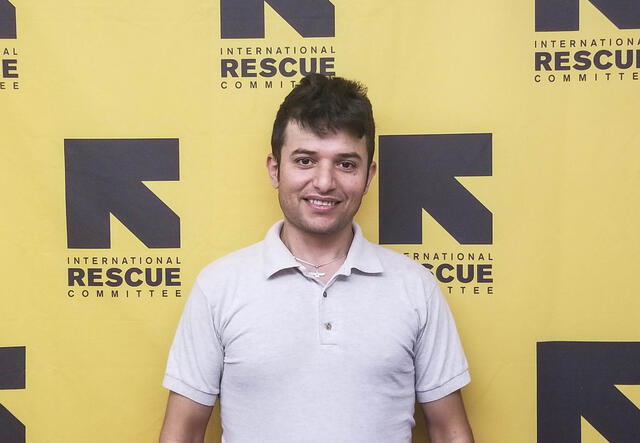
“I had never worked with a bank. In my country, we did not have a bank.”
Hawkar Salih was resettled in Phoenix in 2016. Originally from Iraq, he adjusted to life in the US quickly. The International Rescue Committee (IRC) in Phoenix helped him find an apartment, access healthcare, and attend classes, including English language, financial literacy, and others.
Through his financial literacy classes, Hawkar learned a basic overview of finance in the United States, including how to use bank accounts and to budget for his new life in the US. “Refugees understand how to save, but they do not have bank accounts in most of the countries that they come from. They don’t trust the banks in their home countries,” said Phyllis Korogodsky, Loan Officer with the IRC in Phoenix. The IRC worked with Hawkar to set up his first bank account at a local credit union, an important step to financial independence.
Hawkar’s first job in the US was at a local pizzeria. Though he had to ride a bike and take the bus for 2 hours each way to make it to the pizzeria, he was unfazed. He quickly realized that he needed a car to reduce his commute time and, at the same time, to figure out ways to increase his employment opportunities. Hawkar applied for a loan at a car dealership and two banks, but was turned down each time. He reached out to the IRC for help.
As part of IRC Phoenix services to assist refugees on the path to self-sufficiency, Hawkar was enrolled in the IRC’s economic empowerment program, offering credit-building and low-interest auto loans, coupled with financial coaching as a way to support clients’ financial stability.
As a result of the financial coaching, it was determined that Hawkar needed to improve his credit. According to Phyllis, “refugees usually come with no credit. In America, it’s critical to have a good credit score.” To improve his credit score, Hawkar participated in a credit-building loan with the IRC. He was loaned a small amount of money that he could pay back, effectively building his credit score. Phyllis describes this first loan as a “rocket ride”, because it can quickly bring a refugee’s credit score from 0 to 670.
After the credit-building loan, Hawkar began to financially plan to afford a car. He first began saving for the car purchase, through the IRC’s Individual Development Accounts (IDA) program. The IDA program teaches refugees how to save for major purchases, such as a car or home, while providing a cash match to their earned income savings. In Hawkar’s case, he was able to save $2,000 for the car purchase, which was matched with another $2,000 by the IRC IDA program. He then participated in the IRC’s consumer lending program and secured a low-interest auto loan through the IRC. With the combination of the loan and his savings, he was able to purchase his first car in the United States, a 2010 Honda Civic.
Since purchasing his car, Hawkar has continued to use his budgeting skills and savings practices. He has used these new skills to improve his finances and now boasts a credit score over 720. He recently completed his training for a commercial driver’s license and has begun working as a commercial truck driver. He plans to save money for a few years, then open a small business in the Valley.
The IRC is so impressed Hawkar’s drive and his contribution to our community. Hawkar is grateful for all of the support that he has received. “Whenever I had any problems, I called the IRC… The IRC is my second home.”
Story by Stanford Prescott. Photos by Stanford Prescott.
